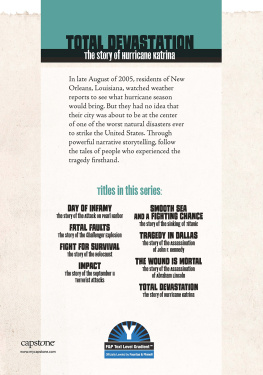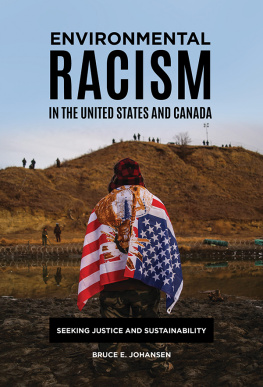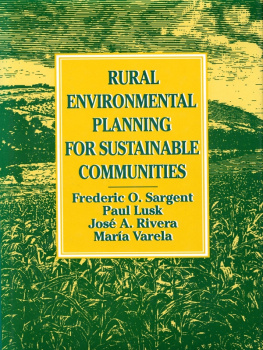Copyright 2007 by Pine Forge Press
All rights reserved. No part of this book may be reproduced or utilized in any form or by any means, electronic or mechanical, including photocopying, recording, or by any information storage and retrieval system, without permission in writing from the publisher.
For information:
 | Pine Forge Press
A Sage Publications Company
2455 Teller Road
Thousand Oaks, California 91320
E-mail: order@sagepub.com |
Sage Publications Ltd.
1 Olivers Yard
55 City Road
London EC1Y 1SP
United Kingdom |
Sage Publications India Pvt. Ltd.
B-42, Panchsheel Enclave
Post Box 4109
New Delhi 110 017 India |
Printed in the United States of America
Library of Congress Cataloging-in-Publication Data
Gunter, Valerie J. (Valerie Jan), 1961
Volatile places: A sociology of communities and environmental controversies / Valerie Gunter, Steve Kroll-Smith.
p. cm.
Includes bibliographical references and index.
ISBN 0-7619-8750-9 or 978-0-7619-8750-5 (pbk.: acid-free paper)
1. Environmentalism. 2. Human beingsEffect of environment on. 3. Environmental psychology. I. Kroll-Smith, J. Stephen, 1947- II. Title.
GE195.G86 2007
363.7dc22
2006016905
This book is printed on acid-free paper.
06 07 08 09 10 10 9 8 7 6 5 4 3 2 1
Acquisitions Editor:
Editorial Assistant:
Production Editor:
Copy Editor:
Typesetter:
Indexer:
Cover Designer: | Benjamin Penner
Camille Herrera
Denise Santoyo
Barbara Coster
C&M Digitals (P) Ltd.
Kathy Paparchontis
Candice Harman |
About the Authors
Valerie Gunter is Associate Professor in the Department of Sociology at the University of New Orleans. Following the ravages of Hurricane Katrina, she spent a year as Visiting Associate Professor at Michigan State University, from which she had received her PhD in sociology in 1994. She has spent over 20 years researching the controversial processes by which environmental issues become registered on community and national political agendas. Articles reporting the results from this research have been published in such journals as Social Problems, The Sociological Quarterly, The American Sociologist, Sociological Inquiry, and Rural Sociology. She is a coeditor of Illness and the Environment: A Reader in Contested Medicine.
Steve Kroll-Smith is Head of the Department of Sociology at the University of North Carolina in Greensboro. He was formerly Research Professor of Sociology at the University of New Orleans. He has edited and written five books on environmental hazards and disasters, health and the environment, and sociologists as expert witnesses. He is the current editor of Sociological Inquiry and the 2004 recipient of the American Sociological Associations Distinguished Contribution Award in the study of environment and technology. His current work is the problem of race, class, and water in New Orleans in the aftermath of Hurricanes Katrina and Rita. He also regularly contributes to the growing scholarship on the sociology of sleep.
Preface
I t is now commonplace to recognize that people change environments and environments, in turn, change people. More important, these reciprocal effects often occur in neighborhoods, villages, and towns, localities that we loosely call communities. Students of environments and societies soon recognize that a substantial portion of their subject matter intersects with that social arrangement commonly called the community. Hundreds of empirical studies now registered in the literature are organized around the variable effects of environmental changes on the anatomy of communities. In spite of the almost unavoidable presence of community in the human-environment encounter, there are no books that look specifically at the intersections of humans, environments, and communities. This book was written to provide students of all kindsundergraduate, graduate, and facultywith an analytical guide to the investigation of community and environmental controversies. It begins with a simple observation, to wit, environmental issues are almost always contested and are likely to transform communities into volatile places. Using dozens of case studies written and organized around specific themes, we develop an array of ideas and orientations that should prove valuable to anyone interested in the spirited public controversies that almost always occur when environments become community problems.
Imagine this book as a trail map of a national park. The purpose of the map is twofold: to prevent you from getting hopelessly lost and to suggest points or places on your trek to stop and look, to examine with some care what is around you or just ahead. As a map of local environmental controversies, this book will help you from getting confused and befuddled by the complexity of environmental troubles and community conflicts. It promises that for all their apparent disorder, these conflicts are not random and unpredictable. On the contrary, if viewed from, say, the presence of the past, perceptions of fairness, or oppositional activity, significant features of these controversies become visible and knowable.
offer five quite different outlooks on local environmental controversies. As a place on the map, each outlook is an invitation to stop and carefully examine a particular set of issues that are both shaping and shaped by social and environmental conflict. Each of these substantive chapters is a place to begin a thesis, dissertation, paper, or book. Taken in their totality, each one of these five chapters might itself serve as a book chapter. Two or more chapters could be combined into a unique study of, say, social and brute facts and perceptions of fairness in a local preservation controversy.
There is a second, more implicit, invitation in this book that cannot go unmentioned. Its basis is a simple, but affecting, observation summed up nicely by Kenneth Burke. Every insight, he reminds us, contains its own special kind of blindness. Put another way, each chapter in this book possesses a circumference. It points to where a particular interpretation stops. And here, readers, is where you are invited to toss the map aside and become your own sociological cartographers. Acknowledging the inherent limitations of any insight, concept, theory, or point of view is an invitation to others to add, modify, innovate, or abandon and start anew. By its very limitations, sociological inquiry is pluralistic.
So, in closing, we invite you to examine local environmental controversies through the manifold lenses we provide. Or, should these prove inadequate, we invite you to modify them or create your own and discover something new and different to question, examine, and interpret.









